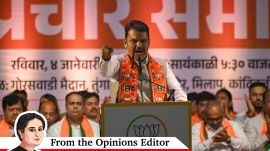
- Abbreviation BJP
- President J. P. Nadda
- Treasurer Rajesh Agarwal
- Founder Atal Bihari Vajpayee, Lal Krishna Advani, Murli Manohar Joshi, Nanaji Deshmukh, KR Malkani, Sikandar Bakht, Vijay Kumar Malhotra, Vijaya Raje Scindia, Bhairon Singh Shekhawat, Shanta Kumar, Ram Jethmalani, Jagannathrao Joshi
- Founded 6 April 1980 (44 Years Ago) (1980-04-06)
- Country India
- Headquarters 6-A, Deen Dayal Upadhyaya Marg, New Delhi, Delhi, India
- Eci Status National Party
- Parliamentary Chairperson Narendra Modi (Prime Minister)
- Ideology Conservatism (Indian), Neoliberalism, Integral Humanism, Hindutva, Hindu Nationalism, Right-wing Populism
Other Related Pages:
Bharatiya Janata Party (BJP) BIOGRAPHY
Last Updated : 03 Feb 2025BHARATIYA JANATA PARTY NEWS
Vandita Mishra writes: Two stories from Maharashtra’s local polls, one puzzle of India’s politics
January 11, 2026 10:35 pm
Unlikely partnerships stitched up in Ambernath and Akot, between BJP and Congress, and between BJP and AIMIM, point to a pervasive reality: Despite the rhetoric and reality of political-ideological polarisation at the top, there is a fuzziness down below
PMC Election 2026: Date, wards, voters, parties — all you need to know
January 11, 2026 7:31 pm
The term of the elected body ended in 2022, but elections remained on hold following litigation in the Supreme Court over OBC reservation
In Sabarimala priest’s arrest, BJP sees an opening to take on the Left
January 10, 2026 7:27 pm
Party plans protest, says arrest meant to shield CPM, Congress leaders involved in gold theft scandal
‘Plot’ during MVA rule to arrest Fadnavis: Days before retiring, ex-Maharashtra top cop Rashmi Shukla recommended lodging case against ex-DGP Sanjay Pandey, two other cops
January 10, 2026 10:13 pm
While Shukla, Pandey and officers in the SIT did not respond, sources close to Pandey said that an FIR has already been registered against him in a case with similar allegations by the police.
'People vote on basis of work done, not religion': BJP's 'Vinod Bhaiya' eyes second term
January 09, 2026 10:33 pm
After his candidature was announced by his party last month, Vinod Mishra has been carrying out door to door campaign in his constituency.
‘Conspiracy to delete large number of voters’: Assam Opposition steps up ‘vote chori’ claims against BJP, approaches police, ECI
January 09, 2026 8:42 pm
Congress’s Ripun Bora went to the police station along with leaders from Raijor Dal, Asom Jatiya Parishad, CPI(ML) and CPI(M) — parties that have been trying to stitch together an anti-BJP alliance
'Why are you so worried, Mamata ji?': BJP raps West Bengal CM for ‘snatching files’ during ED raid at I-PAC chief Pratik Jain’s Kolkata house
January 10, 2026 10:29 am
The ED on Thursday conducted the raid at Pratik Jain's residence in Kolkata as part of a money laundering probe into an alleged multi-crore rupee coal pilferage scam.
From missing Birs to Gurbani broadcast rights: A CA’s arrest puts Sukhbir Singh Badal link under spotlight
January 09, 2026 2:57 pm
Satinder Singh Kohli’s arrest in the 328 missing Birs case and his link to SAD leader Sukhbir Singh Badal are under scrutiny again—this time, over the distribution of PTC Punjabi in Canada.
As Chandigarh mayoral polls near, race for top posts heats up; nominations to be filed on January 22
January 09, 2026 12:00 pm
Speculation about a possible AAP-Congress tie-up had been doing the rounds ahead of the Chandigarh mayoral polls, but recent sharp exchanges between leaders of the two parties have diluted the buzz.
Fresh row in Indore: Collector, mayor attend meeting in RSS office
January 09, 2026 6:16 am
Congress questions admn’s ‘impartiality’; BJP says ‘courtesy’ call, nothing wrong.
BHARATIYA JANATA PARTY PHOTOS
As 'Nabanna Abhijan' rally turns violent; Bengal BJP calls for 12-hour bandh on Wed
August 27, 2024 8:40 pm
The Nabanna Abhijan was called by a little-known students’ outfit Paschim Banga Chhatra Samaj.
From 'jai samvidhan' to 'jai bhim', Rahul Gandhi, other MPs raise slogans in LS during oath
June 25, 2024 10:30 pm
The oath-taking of newly elected members of the 18th Lok Sabha resumed on Tuesday, the second day of the first session of the Lower House of Parliament.
Modi sworn in as PM for 3rd consecutive term; 5 allies get one Cabinet berth each
June 09, 2024 11:09 pm
The 72-member Union Council of Ministers which was administered the oath of office by President Droupadi Murmu included 30 Cabinet Ministers and 5 Ministers of State (independent charge).
PM Narendra Modi at the victory celebrations in New Delhi
June 04, 2024 11:34 pm
With NDA rising victorious in the Lok Sabha elections, PM Modi addresses the crowd and congratulates all the candidates and NDA workers for the win.
Rahul Gandhi paints Delhi’s Anand Vihar red; turns ‘coolie’, interacts with porters
September 21, 2023 10:18 pm
The Gandhi scion went on to don the red uniform shirt and badge they gave him and briefly carried a suitcase on his head as he walked along with them.
Oppn forms INDIA alliance to take on BJP-led NDA in 2024 polls
July 19, 2023 3:58 pm
The meeting in Bengaluru where 26 Opposition parties participated came to an end on Tuesday.
In Pictures | Congress, Opposition parties hold 'Tiranga March' from Parliament to Vijay Chowk
April 06, 2023 1:57 pm
From launching a 'Tiranga march', to boycotting the customary evening tea hosted by the Speaker — the Opposition continued their protest against the Centre even after the Lok Sabha's Budget session ended as scheduled on Thursday.
Raghuram Rajan joins Bharat Jodo Yatra, Oppn stages walkout from both Houses: Top political events in pictures
December 14, 2022 5:55 pm
BJP held a parliament meeting on Wednesday, which was attended by PM Modi, Rajnath Singh, Amit Shah and J P Nadda. Udhayanidhi Stalin also took oath as Tamil Nadu Minister.
A sea of saffron in Gujarat as BJP makes history in Assembly polls
December 08, 2022 2:39 pm
More Entertainment


BHARATIYA JANATA PARTY VIDEOS
Pema Khandu Takes Oath as Arunachal Pradesh CM for Third Term
June 13, 2024 2:14 pm
Pema Khandu was sworn in as the Chief Minister of Arunachal Pradesh for the third time today, following the BJP's decisive victory in the recent Assembly elections. The oath ceremony, held in Itanagar, saw eleven cabinet members also taking their oaths. Arunachal Pradesh Governor KT Parnaik administered the oath, with notable attendees including Union Home Minister Amit Shah, BJP President JP Nadda, Minister Kiren Rijiju, and Assam Chief Minister Himanta Biswa Sarma.
Explained: What has been the BJP’s stand over the years on Ram temple
June 22, 2020 6:07 pm
From the Vajpayee years to Narendra Modi’s BJP, a look at how the party handled the sensitive issue of building a Ram temple at the disputed site in Ayodhya.
‘The notion that your neighbour is your kin, regardless of faith, is a real thing in South India’
June 22, 2020 6:08 pm
Historian Rajmohan Gandhi talks about the need to chronicle Southern history and why he feels that the region is ‘losing voice’ in Delhi. In a discussion with journalists from Indian Express, he calls the recent lynchings ‘tragic, shameful’.
BJP's star campaigner Yogi Adityanath’s emotive appeals turn a damp squib | DECISION 2018
June 22, 2020 6:08 pm
Yogi Adityanath, the man in a saffron robe, has emerged as one of the star campaigners for the BJP in the last few elections. But his speeches in this election making a strong Hindutva pitch failed to get any results.
As TRS sweeps Telangana, here’s what worked in KCR’s favour | DECISION 2018
June 22, 2020 6:08 pm
K Chandrashekhar Rao will continue as Chief Minister of Telangana for a second term. The victory is, for the most part, not a surprise. But here’s what worked in his favour. And what about the Congress-TDP alliance? Liz Mathew breaks it down.
Campaign heat: The allegations, the promises and more. Who said what on the campaign trail
June 22, 2020 6:08 pm
In the five states where elections were held, here's what national leaders of the BJP and Congress promised to the people.
DECISION 2018: What's at stake in the 5 states this election
June 22, 2020 6:08 pm
As the results of assembly elections in five states unfold, here's a look at the mammoth exercise undertaken by the Election Commission of India.
Is VHP’s Ayodhya mobilisation bringing back fears of the 1992 Babri demolition?
June 22, 2020 6:09 pm
Is the Ayodhya mobilisation now as powerful and potent as it was in 1992? Are there law and order concerns for the Centre and Uttar Pradesh government, both now ruled by the BJP? And most importantly, is it fair to compare 2018 to 1992?
The Agrarian Unrest Part 1: This could be the Narendra Modi government’s biggest problem
June 22, 2020 6:09 pm
Thousands of farmers from across the country have taken to the streets. ‘Dilli chalo’ is their slogan. What do they want? And is agrarian distress this government’s biggest problem? Harish Damodaran explains.
Speech analysis: How Amit Shah is toning down his attack on illegal migrants
June 22, 2020 6:10 pm
As they say, timing is key. And an analysis of BJP President Amit Shah shows that before a key event across the border, he has dialed down his ferocious speeches against illegal migrants from Bangladesh.



























